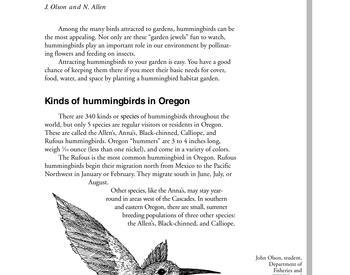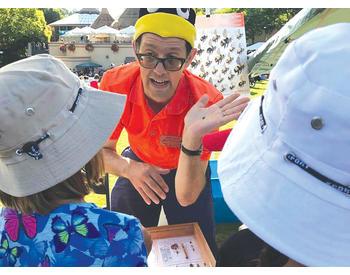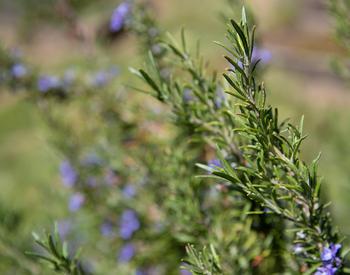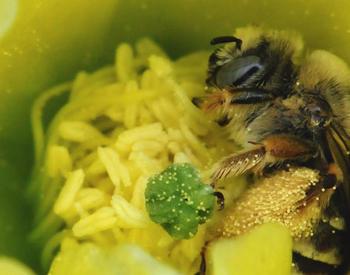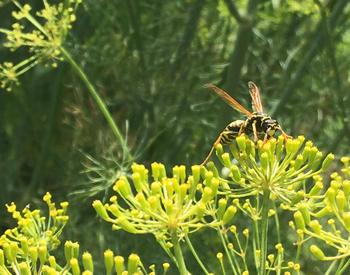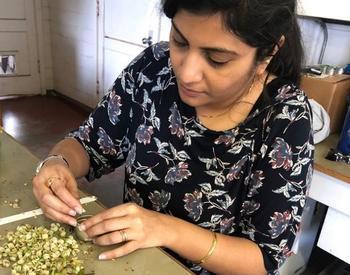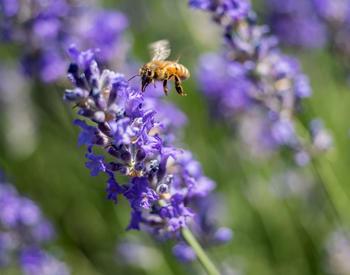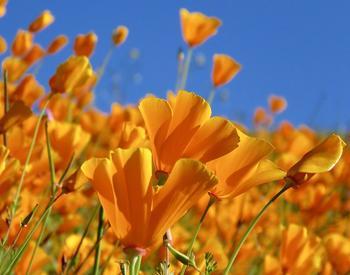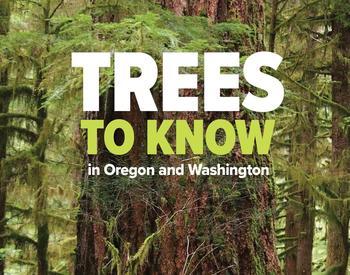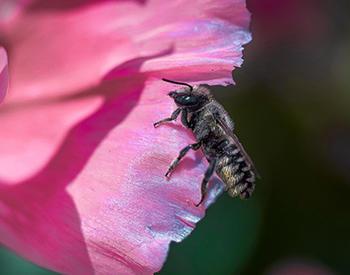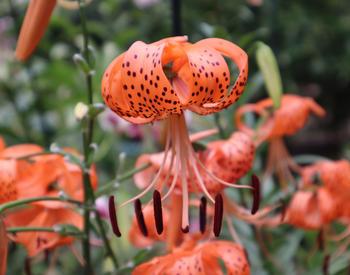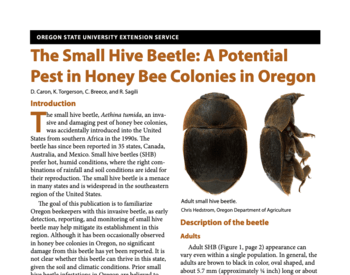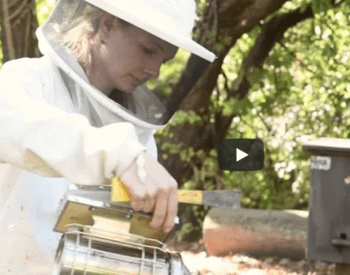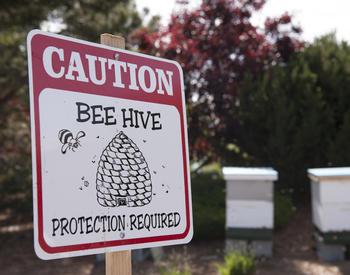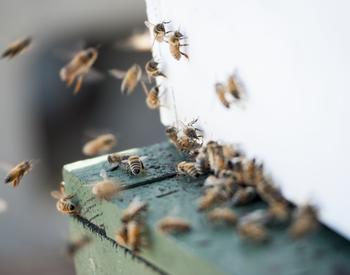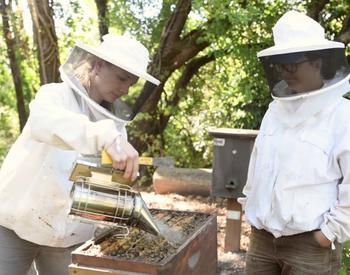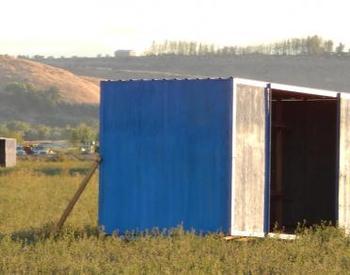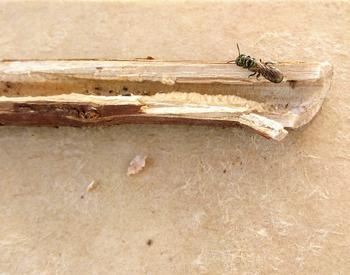Transcript
Andony Melathopoulos: [00:00:00] Man, the Pacific Northwest folks is becoming this pollinator health superpower in the United States. Some of you may, I'm gonna try and get Karen Wright on the podcast soon. Washington State Department just hired on a taxonomist who's gonna lead up the Washington State b Atlas, but. Really super exciting is a new extension position.
Kelly Hanick is the Assistant professor of Pollinator Research and Extension. She's gonna be my guest today. Dr. Hanick has been in Washington. Many of she's been with a W S U B program where she was doing post-doctoral work starting in 2020, but she's got a, this new role. We're gonna hear in this episode her background, which is extensive.
She's worked with so many different people, coast to coast honeybees, wild bees, truly impressive. And she's gonna tell us a little bit about her short-term vision, what she wants to get done in the next year, as well as where the pollinator. Research and extension program at [00:01:00] WS u might go in the future real.
So this week on pollination, exciting times in the Pacific Northwest as I'm joined by Dr. Kelly Kalanick.
And action.
Welcome to pollination.
Kelly Kulhanek: Thank you. Yeah, thank you very much. Happy to be here.
Andony Melathopoulos: We are so happy that you are here in the Pacific Northwest. This is really great. I think before we get into your new position and what you're doing, which everybody is curious about, tell us about your background in bees.
Maybe even start with what was your first experience working with bees?
Kelly Kulhanek: Sure. So my very first experience working with bees was as an undergraduate. So I did my [00:02:00] undergrad at uc, Berkeley in the Bay Area in California. I'm originally from San Diego, so I'm born and raised in California and.
While I was at Berkeley I was getting a general biology degree and was interested in research and I took like a little two credit class on urban gardening. And it was super interesting. And in that class we learned about the importance of pollination for gardens. And that was like my first even thought about pollination and how it's important like for us as humans.
And I thought that was really cool. So when it came time to get some more research experience, I applied to a pollination lab and it was Dr. Claire Cremins lab at uc, Berkeley. And I worked for a graduate student there by the name of Lauren Nicio, who is now in Oregon. Morgan Yes. Who is now in Oregon.
And her, she was really a great mentor to me when she was a graduate student. And I was just a, youngling [00:03:00] undergrad. And her research at the time was looking at pollination diversity in Yosemite National Park in response to wildfire. And so these. Summer field seasons were in Yosemite National Park, like backpacking through the wilderness sampling bees.
Oh wow. And keeping track of what plants they were visiting. And during the semesters it was sorting through all these amazing, beautiful specimens that she had brought back and. It was just like really the best experience and I loved it so much, . And then, when it came time to graduate and to move on, I knew I probably was gonna need some more research experience and was already thinking about grad school.
So I applied to a position with the US Geological Survey in North Dakota, and that was working. Clint Otto's group up there doing entirely honeybee work. So that was like big commercial honeybee pollination in the honey basket of the United States. So really, and, intensive ag areas, so [00:04:00] totally different from what I had done as an undergrad
And I'd say yeah. Yeah. And it just struck me like, wow, these are both, pollination related and isn't it so interesting how wide of a range of needs we get met by these little animal pollinators. And that was my first experience with honey, be. My first time seeing a honeybee colony and I was just blown away.
I thought it was the coolest thing ever. I was totally hooked and I also really liked that there's a human element as well, , when you work with honeybees, you get to work with beekeepers also, and I really liked that intersection between people and these really cool little social insects and agriculture.
So I decided I wanted to do grad school in the honeybee realm. And then I went to University of Maryland to get my PhD. And so that was with Dr. Dennis Mann Engels and his group out there and the be informed partnership. And that just ended up being another really great experience where I got to make all these amazing connections with all these different researchers all over the country.
And I had a lot of opportunity to [00:05:00] work with beekeepers and I studied, beekeeping management practices and OA treatments, and worked with this citizen science program with all these beekeepers all over the place and. It just, it was really the best experience and led me eventually here to Washington State where I started as a postdoc in 2020 and have continued on doing beekeeping management practice work and then finally in June of last year.
I got my assistant professorship position here. Now I am an assistant professor of Pollinator Research and extension here at Washington State. And think we'll talk more about my program in a little bit, but really excited to be here in the Pacific Northwest and serving the stakeholders in this area.
Andony Melathopoulos: We are so excited to have you up here. I think, it I remember when I started here in this, in a similar charge in pollinator health, having this kind of broad charge of extension programming that may not necessarily just apply to APA culture and you certain. Only have the [00:06:00] breadth of experience.
I also think it's wonderful that two of your past mentors have also come to the Pacific Northwest. Dr. Panio and Dr. Kremen are both up here now this is great. This is a really wonderful trajectory and I the wonderful thing as well is you've been in Washington, so you know, you've gotten a sense of the landscape in Washington.
It has some of the largest pollination needs in the us. California is the big one, but when you come to Washington, it's a big, big in all sorts of ways, big in terms of honeybees. I think about, callings that are headed your way right now. , yes. But also in terms of non APU pollinators, it's like a very big area.
Tell give, just give our listeners who aren't from Washington a paint a kind of paintbrush of like, why Washington is this really this B Mecca .
Kelly Kulhanek: Yeah. It's been so great and so fascinating to get to know the agricultural landscape here in Washington and coming from. Doing my PhD in Maryland, and that's where the majority of my bee experience took [00:07:00] place.
That's a small state and there was a good amount of agriculture in Maryland, but just on a smaller scale. And beekeeping too, on a smaller scale, not a lot of huge commercial migratory beekeeping operations based in Maryland. Yeah, that's one of the reasons I wanted to come to Washington State is to get this experience, with these huge beekeeping operations and also this larger scale agriculture and Washington has been super interesting.
So the agricultural landscape in Washington is pretty diverse, and we have lots of different tree fruit crops, specialty crops, and many of those are bee pollinated. And if you think about, and a lot of this information's on the W S D A website, so they have all these great graphics if people are interested.
But if you think of some of the top 10 things that Washington produces, apples is our number one product, and that is be pollinated. We also have cherries, blueberries pears, apricots, raspberries, all of these things that are, really huge produ products in Washington.
And that Washington is a top producer of in the [00:08:00] country are animal pollinated and more specifically be pollinated and. We also have smaller crops that I don't even think people think about as much but are also really important. All these vegetable seeds, carrot and onion seed.
So really just a huge variety of needs and situations in which bees are being used in this state. And, honey bees are the most prevalent pollinator in agricultural systems. Our state is home to about a hundred thousand colonies. Many more than that are brought into the state to meet the pollination demands of these crops.
And it is a very pollination dependent state. And you mentioned non apes bees. We also have other crops that are better pollinated or benefit from pollination in addition to honey bees by other bees. So some examples of that are things like alfalfa seed production. The alfalfa leaf cutter bee is better at pollinating alfalfa seed than honeybees.
And if you think about, what alfalfa's used for that feeds back into the cattle industry, the dairy industry. Really even a larger scale than just the [00:09:00] straightforward crops that we directly eat. Other parts of our food chain are reliant on this as well. Blue Orchard Mason bees are used for other things as well.
Lots of tree fruit. And we have those produced in this state and people like to keep those at home as a hobby too. So yeah, lots. Just different things going on with pollination and I'm, still of getting to know a lot of these things and meeting a lot of people who do a lot of these different things.
And that's been really fun for me to see all these different situations. And then, sorry, go ahead.
Andony Melathopoulos: No, that's good. Keep going. I wanna, I keep, I wanna I just wanted, no, maybe I'll quickly, but in I'll, I was gonna say that I recently learned that when it comes to Blue Orchard Bees, Washington and Oregon are the, we export them, we make them in large numbers here, and then they go to California.
This is a really productive place for them as.
Kelly Kulhanek: Yeah, super interesting. I had not really come into contact much with Blue Orchard Bees before coming here, so that's been a really cool new experience for me. And then, yeah, I was just gonna mention like the hobbyist aspect of beekeeping in this state too.
A [00:10:00] lot of our stakeholders are these big commercial beekeepers, but are also smaller scale beekeepers. There's a lot of interest in this hobby or backyard beekeeping. In urban areas in Washington the Washington State Beekeepers Association is super active and there's lots of local beekeeping organizations too.
Getting to know all those folks has been really fun. And Master Gardeners too, right? They are super active in this state as well. Huge Master gardener programs really focused on. Creating bee habitat and making sure there's, nesting sites available for non apes bees, for native bees. So yeah, it's really just been, the more I'm in this position, the more I get to know just different types of people all who care so much about pollinator health in this state.
So I think. The structure is really in place for my job to be relatively easy because there's already so many people here who wanna help and who wanna do so much good. And I, it's just a really exciting time, I think for Washington. So you've got this
Andony Melathopoulos: huge charge just in people [00:11:00] interested, I think about master gardeners or backyard beekeepers who have them from Spokane to Olympia, Bellingham, tri-Cities area.
Of course there's Seattle. That's a huge area. And if I understood correctly, this position is nicely, centrally located in the center of it all. Tell us a little bit about where you're located and then I wanna ask you about the.
Kelly Kulhanek: Yeah. Okay. Great question. I'm currently located in Pullman, Washington and for those who aren't familiar with the state of Washington, Pullman is about six miles from Idaho.
So we are way on the eastern side of the state, . So not a lot of easy access to most of those areas you just mentioned and a little bit isolated. out here. We're in Whitman County. For those who don't know Whitman County. Like the nation's leading wheat producing county. Not a lot going on here for bees.
Most of the honey we make in Pullman is canola honey. And that's pretty much like our main honey producing crop out here. So not necessarily the best, most centrally located. Area for, an extension position where I [00:12:00] need to be interacting with people from all over the state. So my new position is actually based out of our brand new special beekeeping and pollinator research and extension facility in Othello, Washington.
And so that is much more centrally located in the state of Washington. It's in south central Washington. And a lot easier access to people from the east side of Washington, but also from the west side. Is your access for me to get to all those different places? And we've had that facility in the B program since March of 2020.
The opening event for that facility was the last public event that W S U held before Covid . Oh dear . Getting it up and running, has been a little bit. A little bit slow because of the pandemic, but I think, with my new position in place and being located in that facility, I think we should really hit the ground running now and get everything up and running and, hold in person events there.
And we just, I think it has a lot of potential and I, we really can't wait to see what becomes of it.
Andony Melathopoulos: [00:13:00] So exciting. I can just imagine beekeepers just like taking a little detour off the interstate and popping up to the fellow to see what's new. .
Kelly Kulhanek: Yes. Welcome. Please stop by everybody come swing by.
We'll have like handouts and pamphlets and all sorts of goodies for people to grab when they come by.
Andony Melathopoulos: Let's talk about the ground that you're gonna be running on cuz it is extensive. What is the focus of the position at, at W S U And if you were, you're starting a position, I've often had people who've just come into new positions, what is your short term goal?
What do you see, needing to get done over the next year and your longer horizon of of what you like the program to.
Kelly Kulhanek: Yeah, great question. My official title is Assistant Professor of Pollinator Research and Extension. So that is pretty broad , right? . There's lots of different directions I think people could go.
My, most of my background is, with honeybee management research and so I have a couple short term goals around doing research on best beekeeping management practices, making sure. Those studies are [00:14:00] very specifically tailored for Washington Beekeepers and for Pacific Northwest beekeepers.
I think there's room to improve some of our really generalized recommendations and make them very specifically tailored for our climate and our phonology of, our seasons and things like that. So that's one of my short-term goals. And then, A lot of our short-term goals are centered around education and more of the extension component.
And so one of the things I'm super excited about and I think will be a big focus of my first year is the Washington State Master Beekeeper Program. And the Master Beekeeper program in this state has been relatively quiet for the last few years. But the Washington State Beekeepers Association has approached us to partner with them to develop this brand new master beekeeper course.
And so our goal is to have this developed by the end of this year so people could start taking it in 2024. And yeah, I'm really excited [00:15:00] about it. And so is, the Washington State Beekeepers Association, I. Oregon has a really fantastic master beekeeper program and a lot of Washington beekeepers have been going through that program.
And we just really wanna develop something in-house in Washington to, again, make sure that our master beekeepers are getting the most up to date specific Washington related information that they can, so that they can go forth and train other beekeepers and the public and other stakeholders.
With really sound. Data based scientific information, so I'm super excited about that. I think it's gonna be really fun and a lot of work, but very rewarding. So I can't wait.
Andony Melathopoulos: Those are really ambitious kind of short-term goals, and I think if I heard you right, the launch for the master beekeeping program would be 2024.
So this is gonna be, a lot on your plate on the front end. Where do you see this position? Now that you, I guess I, I was thinking how I would've answered that question when I first arrived here. In some sense, I had to get a lay of the land a little bit [00:16:00] more before I knew. How the program be structured, but from this standpoint we'll come back, we'll ask you again, , but oh boy.
do you stand right now? Where do you kind see the kind of way that the program will ex needs to expand because it does sound like this very short-term urgent need to be able to get new beekeepers up to speed and to understand some of the practices that they'll. , they would require in order to be able to be more successful.
But what's the
Kelly Kulhanek: long-term goal? Yeah. So I think, my biggest long-term goal is to identify how to best serve stakeholders besides honey beekeepers. So that's my comfort zone and where, my wheelhouse and I think. There's a lot of room to learn from and talk to and get to know other types of stakeholders in Washington state.
I'm thinking of growers of crops who are dependent on bee pollination. I'm thinking of master gardeners. I'm thinking of the general public. And, I think a lot of [00:17:00] communication is gonna need to happen for me to best understand. How to serve them. So it's a little bit open-ended, I think.
And I wanna make sure I leave room in my position to go where the stakeholder need is and to adapt to, different kinds of challenges in these different areas. It is a little bit open-ended right now, and I'm really excited to see where it goes and to make more connections and have more conversations with people.
And I think. Another kind of area that'll be a big focus is this idea of integrated pest and pollinator management. And this is another long-term goal of the program. I think there's a good need for, because we have so many different crops in Washington and just the general public using different pesticides and things like that, I think there's a good need for.
Us to understand how we can use pesticides and how we can develop cropping systems and also gardens and just natural spaces in ways that really support pollinator health and [00:18:00] give us, healthy plants and good control of pests and things like that. So this idea of integrated pests and pollinator management for, all these different groups of stakeholders I think is another sort of long-term.
That I'm hoping will take shape as I have more conversations with people.
Andony Melathopoulos: It is daunting. I know I almost think in some ways Oregon's a mini version of, Washington. We have tree fruits, but we don't have the tree fruits that you have. We've got a very our blueberry industry is a comparable, but you have this huge blueberry industry on the east side that we don't have.
It's, it is like daunting to think of which one of these to tackle. But but I guess it also opens so many huge opportunities, and I hope that parking lot Othello is large because I'm sure people are gonna be dropping in and before long and knocking on your door repeatedly.
Kelly Kulhanek: Yeah I guess I'll just put it out there, here, if any stakeholders are listening, if a blueberry grower's listening and saying, Woman hasn't contacted me to see how she can help. Please reach out. I would love to talk to you, .
Andony Melathopoulos: Let's take a quick break. We got I'm really curious how you're gonna answer this.
We have the segment we do with our guests, so we'll be right back after a little [00:19:00] bit of music. Okay, we are back. We have these three questions. We ask our our guests. I'm so curious what your answers are and the first one is most people know. Do you have a book recommendation for our listeners?
Kelly Kulhanek: Yes. Okay. So I do have a couple book recommendations and they're both from a woman named Hillary Kearney and she has a great sort of business and Instagram. Profile called Girl Next Door Honey. And I love a woman in beekeeping and she has all sorts of cool videos and really cool resources and fun like little games and stuff on her website.
But she has two books that I think are really cool and one of 'em is totally honeybee focused. It's called Queen Spotting, and it's all about, the honeybee queen. But then there's also these little puzzles where she's got these great photos of frames of bees with a queen hidden on there and it's like a, where's Wallow for the Queen?
So a fun little game also. And then she also has the Little Book of Bees, which is more generally about other kinds of bees, not just honey bees. And she does like all her own illustrations and [00:20:00] stuff. And the artwork's really cool. So I think those are both really great. One
Andony Melathopoulos: more
Kelly Kulhanek: time, what is her name?
Hillary Kearney. K e a r n y. Fantastic.
Andony Melathopoulos: Okay, great. I'm gonna f start following her on Instagram. That's
Kelly Kulhanek: wonderful. She's in San Diego, which is where I'm from, so Love that too. . Oh, cool. Even better.
Andony Melathopoulos: Yeah. The next question is for all the work that you've worked with, you've worked with Native Bees, you work with the informed project or Citizen science, you work so many things.
Do you have a go-to tool for all of you, your kind of
Kelly Kulhanek: needs? Yes. So my favorite tool is my camera phone. And oh I think it's really useful for beekeeping, but also, for just other types of bees. You're out in your garden, you see a bee land on your flowers, and you can take a cool picture with your camera phone.
I think, our, we're so lucky to have. Camera phones that have such great cameras these days and they really, you really don't need any special equipment to take good photos. You can get like a little macro lens that you put on your phone [00:21:00] and will actually help you take better bee photos.
But I use my camera phone constantly. Es especially for beekeeping too, if you, it's hard to remember to bring a pen and paper to. Take notes, isn't it? So , ,, , so you can take pictures. I take pictures of things all the time and it helps me remember, I take a picture of the hive tag number and it helps me remember what's going on in which colony.
If I don't have time to take a note and or you can just open your notes app and jot something down on there too. Yeah, I
Andony Melathopoulos: think there's something about that. Like I did this recently cuz I was like, when, what's the latest blueberry has bloomed here. Because, it's this cold air, so I just kinda like scroll through the years in April, may, and I was like, I could get, oh, there's my first buds.
Yeah. I just it's, it just becomes this index of kind of a little encyclopedia. It's not just, I need a picture for a talk. It's kinda like, when did this happen? I love the idea of using your phone as a, your phone pictures as a kind of notepad.
Kelly Kulhanek: Yes, absolutely. Yeah. And you, yeah, it's amazing. How much you forget
So it's really nice to have a visual record of things to go [00:22:00] back and look for. Sure.
Andony Melathopoulos: Okay. That brings us to our last question. Do you have a favorite pollinator species? And tell us a little bit about why.
Kelly Kulhanek: Sure. I think my favorite pollinator species is the European honeybee. I know that's boring, but I wouldn't be here without them.
That was really the first. Pollinator experience I had that was really mind blowing to me to see inside a honey beehive and be so amazed by their social behavior and how complex it is. And I remember like my supervisor pointing out a waggle dance to me and describing what that was, and I was just like, what?
That is, So amazing. I think that's my favorite. But I did pick another one as well, and it's the Rusty Patch Bumblebee, I think a fan favorite. And we love the Rusty Patch Bumblebee. My husband and I have a running joke where every time we see a bumblebee with any orange on it, he's oh look, there's a rusty patch.
I'm like, I don't think so. , I really don't think so, . But it's a running joke we have. And brings a smile to your face. Yeah, those are my two favorites.
Andony Melathopoulos: know, I realized that your former super Dr. Van [00:23:00] Ale store is also from the Pacific Northwest. I think he's from Vancouver originally.
Kelly Kulhanek: Yes. Correct.
Andony Melathopoulos: So you are truly, this is like you meant to
Kelly Kulhanek: be here. This is, it was destiny. We've all come full circle all over the country. Back to the Pacific. No.
Andony Melathopoulos: I do remember talking with Dennis years ago that, I also love the honeybee is my favorite species. It always has been because of the people part that you brought up earlier.
. You could go to any continent and even if you don't know the language, you can still communicate with. Most of the world. In most of the world because everybody the whole planet has kept bees. And it's, I love that social, I love going to a bee club and I love sitting down with commercial beekeepers in their kitchen.
It's really an amazing feeling. Yeah, that's
Kelly Kulhanek: a great point. It beekeeping is such like a unifier, right? Like you can have. Such diverse opinions or backgrounds or come from, totally different places in the world, but everybody has had if you've opened a honeybee colony, that's like such a distinct shared experience that you can [00:24:00] relate to someone.
So it is really special and. I think through the past however many years I've been doing this, that's been my favorite part is just getting to know so many people, going to beekeeping meetings and having people welcome you into their home and cook meals for you and offer you to stay the night in their house.
It's just such a special community and yeah, I think, that's why I'm so hooked and wanna keep doing this forever because the people part is so special. We,
Andony Melathopoulos: on behalf of the listeners in the Pacific Northwest, we're so excited that you're here. You're in the position and we're all looking forward to your program developing and flourishing and having you back on the show many
Kelly Kulhanek: times.
Thank you. Yeah, I'm super excited to be here. , super excited to be helping and yeah, can't wait.
There are some amazing things happening for pollinators in Washington State these days. This week we hear about the brand new Pollinator Health Research and Extension Program.
Dr. Kelly Kulhanek joined the WSU Bee Program as a postdoctoral researcher in 2020 and recently began a new role as Assistant Professor of Pollinator Research and Extension. She is building a program based on regular communication with stakeholders to address needs such as locally specific best practices for bee management and crop pollination, and is developing extension programs that will put the latest research into the hands of stakeholders.
Links Mentioned:
Book recommendation:
Go-to-tool:
Smartphone camera
Favorite pollinator:
